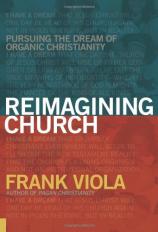Reimagining Church: Pursuing the Dream of Organic Christianity
Review
Reimagining Church: Pursuing the Dream of Organic Christianity
For decades, many churchgoers in the evangelical world have been taught from the pulpit that the church is an organism and not an organization. And many churchgoers nodded in agreement, though if pressed, they would have found it difficult to deny that even the most flexible and liberated congregation still reflected the image of a highly institutionalized organization.
It's this image of the church as an organization that Frank Viola wants to help us dismantle, replacing it with an accurate vision of the church as a genuine organism --- a living, breathing body of people that reflects the Trinity by loving, caring for and submitting to one another in an organic way. The church Viola describes, and the kind he has been involved in for the last 20 years, is a far cry from church as most people know it, and even a far cry from traditional cell groups and house churches, though they are considered nontraditional.
The earliest church meetings, Viola writes, were gatherings in which believers spontaneously broke out into song or prayer or a teaching. They shared their lives with each other, held everything in common and bore one another's burdens as well as their joys. There was no dominant leader, though the more mature believers assumed various responsibilities as needed. "Communion" looked more like a potluck than a ritual. Decisions were made by consensus, and if no consensus could be reached, the body simply did not act.
There's more, much more, involved in the distinction between church as we know it today and the body of Christ as it existed then, and Viola walks us through those distinctions one by one in steering us toward the realization that the early vision for the church can move from dream to reality in the 21st century. In so doing, he seemingly covers all the bases in two exhaustive sections: one on community and gatherings, and the second on leadership and accountability. Then he seemingly covers all the criticism in an appendix in which he helps organic church advocates anticipate objections from traditional leadership and think through their responses.
Among the concepts Viola helps readers "reimagine" are authority, submission, leadership, denominationalism and church unity, and the process of decision-making. One section that many evangelicals will find especially helpful is his deconstruction of "spiritual covering" --- the notion that each believer must be submitted to a leader who in turn is submitted to another leader, and so on.
This is an important book, and its message will resonate especially with that amorphous psychographic that is hungering and thirsting for radical change in the church --- postmoderns, emergents, younger evangelicals, Jesus People baby-boomers, and that all-too-often forgotten group, believers who have been battered and bruised by the church but who still long for the community that deep down they want to believe is possible. Those who are thoroughly entrenched in the institutional church and feel threatened by change won't find much here to their liking.
I have two criticisms, neither of which should keep you from reading the book. One, there's a lot of repetition, which Viola may have felt was necessary to get his point across to readers exposed to early-church practices for the first time. And two, there's a noticeable absence of examples of organic churches in action today. I kept expecting to "see" what organic gatherings look like in 21st-century America, but I guess that's what REIMAGINING CHURCH is all about: imagining for ourselves how we can make this happen in our own lives and our own communities.
Reviewed by Marcia Ford on August 1, 2008
Reimagining Church: Pursuing the Dream of Organic Christianity
- Publication Date: August 1, 2008
- Genres: Christian, Religion, Spirituality
- Paperback: 320 pages
- Publisher: David C. Cook
- ISBN-10: 1434768759
- ISBN-13: 9781434768759




